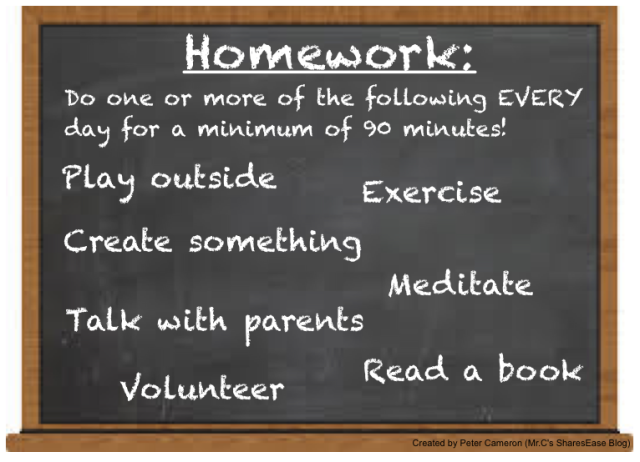 Friday June 10, 2016
Friday June 10, 2016
My views on homework have changed and evolved over my 20+ years of teaching. I’ve arrived at the conclusion that traditional homework has done nothing to improve my students’ academic performance or their ability to think and learn. In fact, I believe it’s had somewhat of the opposite effect. When homework piled up, stress increased and students came back to school tired, overwhelmed and burnt out. I also found that students who had little support from parents or guardians with their homework (whether it be assisting them or encouraging them to get it done) tended to come back with it incomplete. This created a large gap in learning for my students who weren’t able to complete their homework.
Today, homework has evolved to home ‘share’. My students are now tasked a couple times a week to share a piece of writing with a parent, solve or explain their solution to a single “real math” problem or create one of their own. Parents are encouraged to write comments on their child’s work and initial it after their child has shared it with them. The result? Home ‘work’ is getting done much more consistently by all students within my classroom. Parents say they feel more involved in their child’s learning and the stress level within households has diminished. I’ve also found that creating a section in my blog for parents (Parent’s Page) with links to their child’s learning has done much to improve communication and engagement.
Today, after viewing ‘Homework in America vs Homework in Finland’ I created the above Home ‘work’ assignment and a form where my students can track their progress and reflect on their home ‘work’ after each week. I’m wondering what the implications may be.
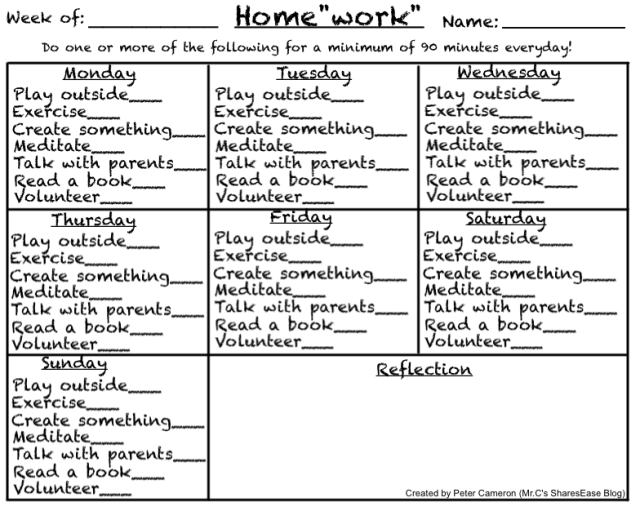 Thanks @markbarnes19 for articulating so wonderfully your take on the idea in your podcast “Your Homework Assignment Is to Meditate, Volunteer, or Create” for your #Hack Learning Series! Thanks, also to all of you on Twitter who weighed in on the idea!
Thanks @markbarnes19 for articulating so wonderfully your take on the idea in your podcast “Your Homework Assignment Is to Meditate, Volunteer, or Create” for your #Hack Learning Series! Thanks, also to all of you on Twitter who weighed in on the idea!
The PDF version of the above two visuals can be downloaded! Click on: Home”work”.
Update: Wednesday June 15
Although I was going to wait until September to give this new Home’work’ a try, after receiving so much interest and positive feedback on Twitter, I was excited to give it a whirl with my class during the last two weeks of school. At the end of the day on Monday June 13, I told my incredible group of students that they would be receiving 90 minutes of homework everyday, including weekends, until the end of the school year. There was a moment of complete silence and utter disbelief until they began reading the following note I had prepared for their parents:
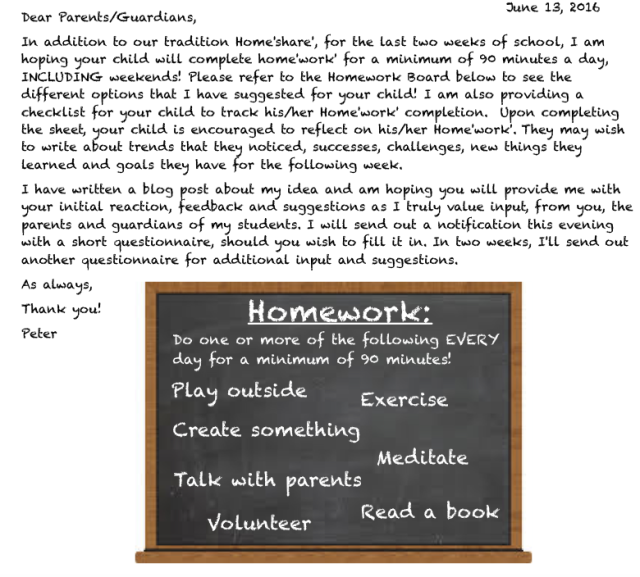
The reaction after reading the note was one of relief and excitement. A flourish of questions followed and my students left for the day, looking forward to start their homework! On Tuesday, my students came back, excited to share how easy the homework was to complete, the things they had created, books they had started to read or continue to read and the types of exercise they had done. We had a discussion about “volunteering” and what that my look like (offering to help a neighbour, parent or sibling were all deemed to be good examples of volunteering). Interestingly, no one offered what they had talked to their parents about. A student inquired how he might meditate at home (we use the ‘Calm Classroom Initiative’ at school) and his peers offered him a number of suggestions. We also discussed the important of balance and challenging ourselves to try things that we haven’t done before. I also shared my Home’work’ chart with my class and told them what my goals for the week were and some of the challenges I anticipated having.
I also elicited initial reaction and input from the parents of my students (‘Initial Parent Feedback Re Home’work’). Their feedback and insights were invaluable in helping me be reflective as I continue to rethink and refine Home’work’.
Update: Monday July 4
Well, after trying my Home’work’ idea during the last two weeks of school, I am very pleased with the results. After the first week, 70% of my students returned to school with their completed homework sheets. The ‘reflection’ piece was somewhat lacking, but after giving some feedback and student exemplars , my kids proved to be very thoughtful and reflective with this part of their assignment. By Wednesday all but 2 of my 25 students had handed in their Home’work’ assignment. My students decided where they would keep their tracking sheets (at home or at school) and seemed committed to completing their Home’work’. At the start of each morning, we had a class discussion about what they did for Home’work’ the evening before, successes and next steps. My students were excited to share, and in doing so, motivated one another to continue with their quest for a more balanced lifestyle.There was no stress for all parties (kids/parents/teachers) involved and there was a general feeling of accomplishment and a sense of working together towards a common goal.
With all the excitement during the last week of school, there was less focus and discussion on our Home’work’, during week two of our trial. With that said, most my students had now taken ownership of their Home’work’ and continued to complete and track it on their own! Although time was limited, my students still came in each day wanting to share what they had accomplished the evening before! At the conclusion on week two, 75% of my students brought back their Home’work’ tracking sheets without prompting or reminders! They wanted to hand it in to me.
At the end of the two weeks, I elicited parent feedback and collected and reviewed student tracking sheets. My takeaways from my Home’work’ trial? I’ll definitely continue with this with my new grade 5/6 class in September. I’m still digesting and reflecting on all the data, with more reflection, I’m sure there will be modifications and changes. Importantly, I’ll also continue with my HomeShare initiative as I have had nothing my success with this type of after school activity. One thing is for certain, in my classroom, “traditional homework” has become a thing of the past.
I’ll continue to update with my thoughts and next steps. As always, your input is welcome!
Update: October 4, 2016
This update is in response to all the wonderful and thought provoking comments to this blog post. It also acts as a means to share my next steps and where I’m currently “at”with Home”work”.
All great and valid points and I appreciate all perspectives. My perspective comes from 20 years of teaching experience, in the same grade at the same school. I am also speaking from a parent’s perspective. My teaching practice has evolved and so must my parenting! If something is not working within our own classrooms or with our own children we must have the courage, passion and determination to change… to do better for our kids. If I’m being honest,” traditional homework” never really “worked” in my classroom(as explained in my post), not 20 years ago and certainly not today.
It was time to innovate for the better. Over the last five years I saw much success with HomeSHARE and tried my new type of Home”work” at the end of last year. This year I continue to leverage technology to connect in powerful ways with the most important stakeholders in our students’ education; their parents. The idea here is to make learning not feel like “work” but the sharing of our time, ideas, questions and answers. Our time is valuable and precious. If we can facilitate more communication about learning between home and school and our students and their parents, there is no doubt we’ll do better for our students than we may have done in the past.
For more information on the topic, visit my Parent’s Page to see how I’m engaging parents in their children’s learning and what HomeSHARE looks like. Also visit my blog post “The Power of Connections” Your input is always appreciated.
-P
Update October 10, 2016
After connecting with my Parents (as explained above) and very successfully establishing “HomeSHARE”in the first month of school, I assigned my first Home”work” assignment on Thursday:
https://twitter.com/cherandpete/status/784005508936048640
I encouraged my students to fill in a short survey with their parents upon completion of their Home”work”. Of the 21 students present 14 of the kids and their parents filled out the survey on Thursday evening. All but three approved me sharing their input on my blog. Below are the results of the survey. Thank you to all the parents and my students who provided feedback as I continue to rethink, restructure and reinvent “homework”!
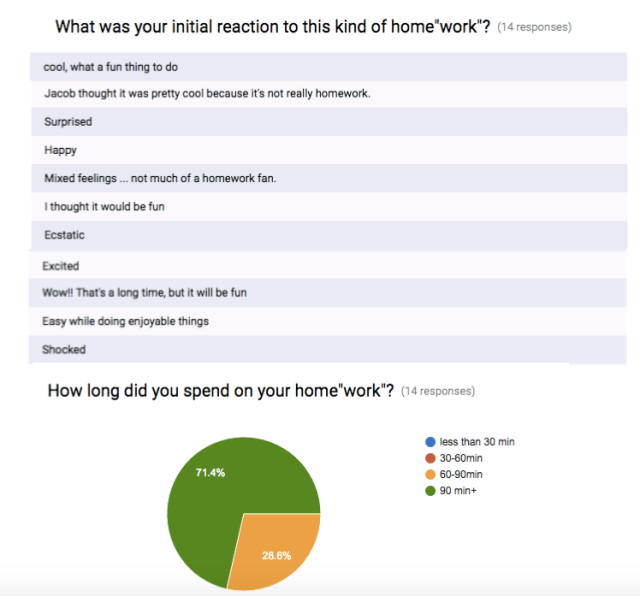
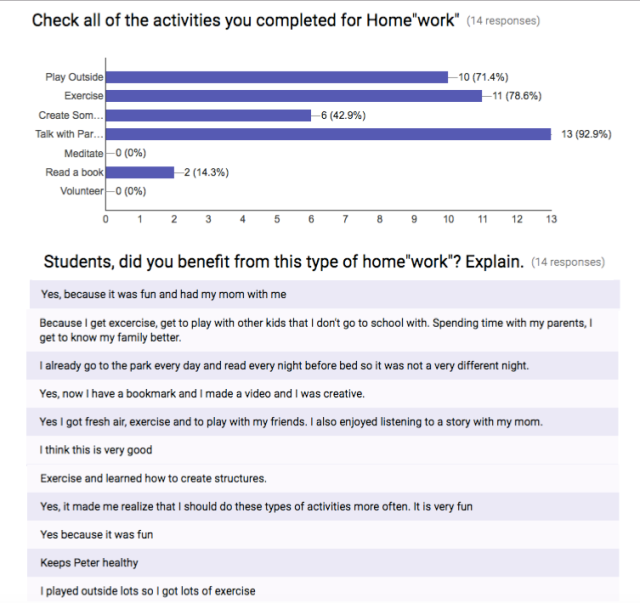
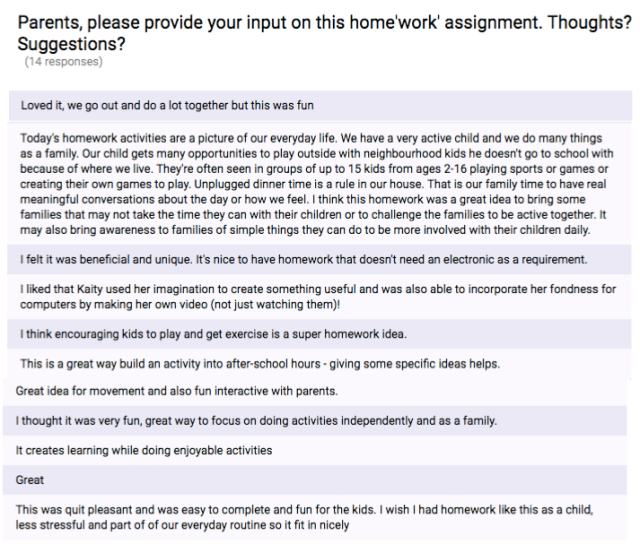

There is a place for remedial homework for those needing to “catch up”. Imagine if students needing to improve basic numeracy skills practiced at home on a daily basis. Memorization of basic math facts goes a long way.
LikeLiked by 1 person
There is no research that proves this helps Don. I know that it goes against every grain of our thinking but 30 questions over and over again to a child who doesn’t get it, means they still don’t get it. Not saying kids don’t need practise at skills just need to think about how and where those skills are being done. What kids need is purposeful and productive homework. Talking, playing, making life experiences is and will help students more than being disconnected from them. Just my humble opinion. Great piece as usual Peter.
LikeLiked by 1 person
Got some research for you MrSo:
http://news.nationalpost.com/news/canada/math-wars-rote-memorization-plays-crucial-role-in-teaching-students-how-to-solve-complex-calculations-study-says
We’ve strayed way too far from learning the basics!
LikeLiked by 1 person
Hi Don, so memorizing for 1 is not the solution. 2 memorizing does not need to be done as homework and 3 memorizing can be done while teaching concepts. 4 to be honest ( and not too sure if your in education or not) students I have taught don’t have the problems with memorizing but using facts. They have nothing for their schemas to relate those facts or be able to use. Also don’t think quoting newspapers as research is very credible. What research has been done (studies and not studies from the 1980s which was when the last test on a large scale was done). The problem is not rote versus procedure but that students need a balance. Also we get off topic of this blog post which is about useful homework. Kids need to talk to their parents about numbers and how to use strategies to solve them not just sit and memorize. If that was the case their would be more adults who know math.
LikeLiked by 1 person
This is simply not true. There is ample research. As this wonderful article says “The evidence for homework is compelling, the evidence against is popular” As always it’s never black or white, and teachers, as professionals selling the idea of “research” and “checking your sources” we need to do a much better job at checking ours.
http://www.ascd.org/publications/educational-leadership/mar07/vol64/num06/The-Case-For-and-Against-Homework.aspx
LikeLike
Hi Phil,
Just a question, did you read your own article.
Just below it says this:
Although teachers across the K–12 spectrum commonly assign homework, research has produced no clear-cut consensus on the benefits of homework at the early elementary grade levels. In his early meta-analysis, Cooper (1989a)
I knew there was some benifits for older grades starting at four but those are small and rise as they get older.
I think we have to be careful what we think we know because it’s what we did. Also we have to not let our teaching experience bias our leadership. Elementary is a very different place then Highschool.
That being said my other concerns are more as a parent. The types of homework I recieve or hear other parents receive is a waste of my child’s and mine time. When they are crying, and spending hours on uselessness there has to be a change.
Also what right does does a teacher have to tell a parent how their child should be spending their time outside of the Instructional day. I get purposeful practise but we as educators have to think about what that looks like.
LikeLike
Hi again
I absolutely read the article. In fact I have also read the meta study which it refers to. When you said to Don “There is no research that proves this helps Don. ” it was not clear that you were talking about in lower school. I thought that you were saying that Don’s entire point was incorrect. However the article I posted suggests that is not the case. The influence of 6 points difference in grade 4 rising to 24 by the upper grades is huge!
I don’t see on Twitter or Facebook people saying “Homework in the lower school is useless” instead it’s “Homework is a waste of time and all the research proves it”
That is simply not the case. At best you could say it’s unclear. Which would be generous. I am totally with you though on the early school age homework though. That’s just daft.
I would also say that practice and memorization can make for excellent homework tasks for older elementary students. Although I qualify that 100% with the fact that what is being memorized must be useful, authentic and age appropriate.
Homework, like worksheets, and rote learning aren’t good or bad. They are all “well it depends”
Great to have an actual debate and discussion instead of everyone just yelling from the same bandwagons.
Phil
LikeLike
Yes I am all for debate. A lot of times I get research thrown at me but people just read the title. It was a great synopsis. My perspective is elementary. I think in education we often do things because it’s the way we always do. I think we need to often consider why and how.
Another concern I have though is homework is often one size fits all. If we are truly their to make homework useful we need to make sure all have a chance to succeed. This means changing and adapting to each student need.
I think the arguments against homework come from a place of the one size fits all and the do 100 questions for the sake of questions.
LikeLike
Why memorize something that you can look up on my device in seconds? If we want kids to love learning for the sake of learning, the ideas presented in this post are a quick path to obtaining this goal.
LikeLiked by 1 person
I certainly agree with what you are saying about traditional homework not being that effective. In Saskatchewan, all students in grade 4-8 have to do health action plans. My grade 6 students have to complete 2 of them over the year. Your alternate homework plan seems to encourage creative thinking, reflection, communication and many other things. It also looks like it encourages a healthier lifestyle and could work hand in hand with the health action plan. Thanks for sharing.
LikeLiked by 1 person
We use our at home time to practice and reinforce concepts. We also are always reading. I like having parents comment on homework. My 13 yr old can accomplish what he needs to during the school day in everything but math. I don’t mind him having homework if it increases a needed skill , but I would be thrilled if he didn’t have the pressure to finish something he just didn’t get and could add comments.
LikeLike
This is great, Pete. I really enjoyed the video comparing homework in America and Finland. A similar situation to that in America also occurs in much of Australia. I like the way you have used the information in the video to trial something new for your students next year. I think it is a great option, though I’m not sure about the 90 minutes. While I think most students will have no difficulty filling the 90 minutes in a variety of ways, I think the 90 minutes might appear a bit daunting at first. It could be interesting to set it at 60 minutes for a start and see how quickly students start doing “extra” homework. I’d be adding play a board game, complete a puzzle, cook something to the list. Or perhaps there could be an extra line with “other” so children and families can choose their own activities, or from a list of suggestions. I definitely applaud this move in, which I consider, the right direction. Well done.
LikeLike
We have implemented a HWK policy recently which supports the research that the ONLY homework task that has any impact on student outcomes for primary aged children is daily reading. The rest is centred on valuable learning which occurs through exploring interests, hobbies, family time, sport and physical activity and of course meditation and unstructured down time. Flipped learning through online resources has also proved valuable.
LikeLike
I’ve always hated homework… since I was a student and nothing has ever changed about that. I didn’t give it for a while, then moved to a new school and got sucked into “this is how we do things” and gave it. This year I went back to my roots and don’t assign any… I’m much more concerned with them being productive members of society, spending time with their families, getting some fresh air. I love this idea of assigning it to them. Great work! ❤
LikeLike
I said that once to my Doctor when we were having a chat about modern education. He replied to me “Is that what kids actually do if they don’t have homework? Mine just watch TV” And you know what. I stopped and thought about that. He is largely correct. They don’t go and build tree houses and play boardgames with their families. They watch TV and YouTube. That still doesn’t provide a good case for homework, but I think we need to get our head out of the clouds and stop presenting the “they will go and do all this amazing stuff” argument because it’s simply not true. I wish it was.
LikeLike
Ugh you’re so right. How sad is that? I love love love technology and (almost) everything that comes with it, but man do I wish kids still played outside until the streetlights came on. I, for one, still climb trees every time I have the opportunity.
LikeLike
oh also, I meant to ask – has this changed your policy of assigning wonderful things?
LikeLike
All great and valid points and I appreciate all perspectives. My perspective comes from 20 years of teaching experience, in the same grade at the same school. I am also speaking from the a parent’s perspective. My teaching practice has evolved and so does my parenting. If something is not working within our own classrooms or with our own children we must have the courage and passion to change… to do better for our kids. If I’m being honest,” traditional homework” never really “worked” (as explained in my post) in my classroom, not 20 years ago and certainly not five years ago. It was time to innovate for the better. I saw much success with HomeSHARE and tried my new type of Home”work” at the end of last year. This year I continue to leverage technology to connect in powerful ways with the most important stakeholders in our students’ education; their parents. The idea here is to make learning not feel like “work” but the sharing of our time, ideas, questions and answers. Our time is valuable and precious. If we can facilitate more communication about learning between home and school and our students and their parents, there is no doubt we’ll do better for our students than we may have done in the past.
For more information on the topic, visit my Parent’s Page https://mrcshareseaseblog.wordpress.com/parents-page/ to see how I’m engaging parents in their children’s learning. Also visit my blog post “The Power of Connections”(https://mrcshareseaseblog.wordpress.com/2016/09/30/am-i-connected/) Your input is always appreciated.
-P
LikeLike
Reblogged this on Teacher Zara Blog.
LikeLike